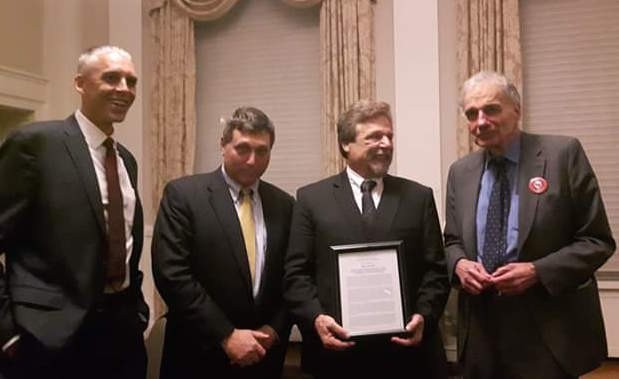
We are proud to announce that Mitch Barnett, who bravely exposed potentially grave safety problems with the Boeing 787 Dreamliner aircraft, has been honored with a prestigious whistleblower prize. Barnett received the Joe A. Callaway Award for Civic Courage from Ralph Nader at a ceremony in Washington, DC on October 30.
Barnett was joined by Brian Knowles and Robert Turkewitz, the attorneys representing him in his whistleblower retaliation case against Boeing. Barnett has received advocacy support from Whistleblowing International and the Government Accountability Project.
News of the award led immediately to an in-depth BBC article about of one of Barnett’s key disclosures – that up to one-fourth of oxygen systems on Boeing’s 787 Dreamliner could be faulty and may not function in an emergency.
For more than 30 years, Barnett worked as a quality-control manager for Boeing – the first 25 years of which he spent at Boeing’s main production facilities in the Seattle area. In 2011 he was transferred to Boeing’s new 1.2 million-square-foot, 7,000-employee plant in Charleston, South Carolina, to assemble the 787 Dreamliner.
Barnett very quickly realized that a large portion of employees were grossly underqualified for their jobs. Many, in fact, were hired directly from fast-food restaurants. “The whole place smelled like French fries,” Barnett says.
Other workers included a former NFL football player who was videotaped for several minutes trying to whack a 787 engine mount in place with a sledge hammer. Incredulous co-workers turned over the tape to managers, but its whereabouts are unknown. Many managers, Barnett says, had little or no prior experience in the aerospace industry.
Barnett witnessed much more serious problems during his first few years in Charleston. Among his responsibilities was making sure defective parts were catalogued, tracked and sequestered from production lines. This included locking up defective parts in a “cage” that only could be accessed by employees authorized to have a key. Barnett also was in charge of cataloguing lost parts and making sure efforts were made to search for them before officially designating them as lost.
Both of these procedures – tracking defective and lost parts – are subject to federal regulations to ensure that broken or incorrect parts are not installed onto aircraft. In both procedures, Barnett witnessed – and has kept the evidence of – serious violations. Defective parts were taken from the cage by unknown persons, he said, and he could not determine whether they were installed onto 787s.
In many cases, managers told Barnett and some of his colleagues to falsify paperwork to indicate that defective and lost parts had been accounted for, when in fact this was not true. In addition, managers gave Barnett and colleagues accelerated timetables to sign off on huge numbers of defective and lost parts that were impossible to meet. This put them in the position of either falsifying the documents or failing to follow management’s instructions. Barnett said he refused to falsify any document, which led to his eventual forced retirement.
Barnett turned over this and other evidence of violations and misconduct to FAA investigators, who substantiated some of his main whistleblower claims — including his information about defective parts being lost.
In one instance in 2016, Barnett discovered a senior manager had taken a dented hydraulic tube from a garbage can. The tube, which is part of the central system controlling the plane’s movement, was installed onto a Dreamliner. Barnett said the senior manager told him, “Don’t worry about it.”
“Don’t worry about” was a common response from Boeing managers in Charleston. He said the quality control and management culture in South Carolina pales in comparison to the commitment by workers at Boeing’s original facilities in Washington state. “It’s like another world in Charleston,” he said. “Things happen there that would never happen in Seattle. It’s shocking. After 25 years at Boeing, I couldn’t believe what I was seeing.”
Further illustrating this was Barnett’s frequent discovery of sharp metal shavings and slivers left inside of fuselages on and near electrical wiring and boxes that command the flight controls. If the sharp metal pieces – produced when fasteners were fitted into nuts – penetrate the wires, Barnett said the result could be “catastrophic.” Officials believe the shavings may have damaged an in-service airplane on one occasion in 2012, the New York Times reported.
“Things happen there that would never happen in Seattle. It’s shocking. After 25 years at Boeing, I couldn’t believe what I was seeing.”

Boeing whistleblower raises doubts over 787 oxygen system
In 2017 the FAA ordered Boeing to clear Dreamliners of shavings before they are delivered. Boeing said it was complying and was working with the supplier to improve the design of the nut. Despite Boeing denials, the FAA confirmed the metal shaving allegation. In response to Barnett’s disclosures, Boeing refused to remove the shavings, disciplined him for putting his concerns in writing, removed his relevant duties, moved him to another part of the Charleston plant, and harassed him until his 2017 retirement.
Barnett also personally found a 25 percent failure rate for passengers’ emergency oxygen supply. He challenged sanitation breakdowns that resulted in nuts, bolts and dirty rags being left around engine parts before flights.
“As a quality manager at Boeing, you’re the last line of defense before a defect makes it out to the flying public,” Barnett told the New York Times. “And I haven’t seen a plane out of Charleston yet that I’d put my name on saying it’s safe and airworthy.”
In addition to the Times, Barnett has appeared on NBC’s Today Show and CNN, and the story has been picked up by many other US media outlets and internationally. In addition to the FAA, he has spoken with staff from the House Transportation and Infrastructure Committee.

